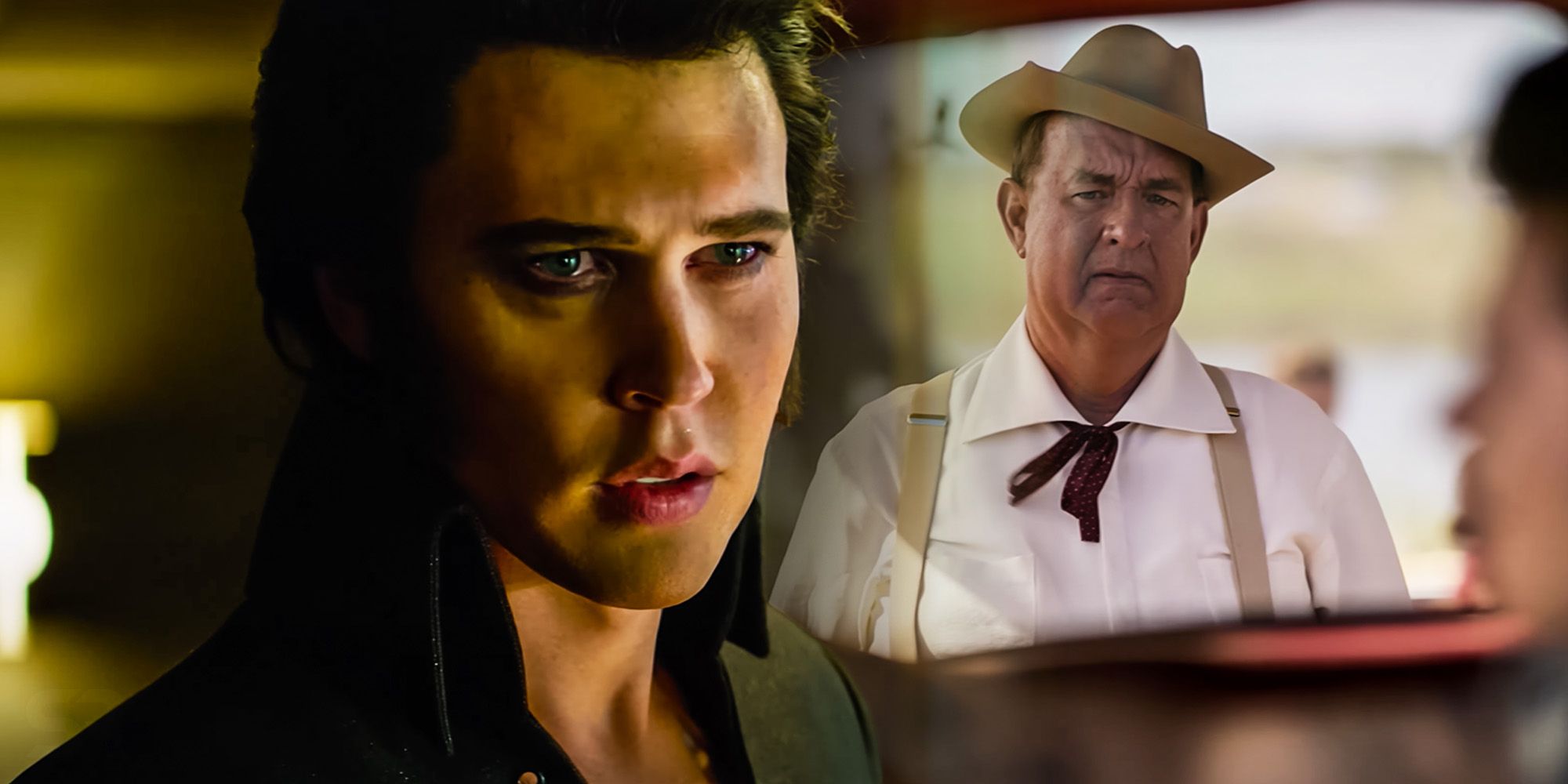
Elvis Ending Explained (In Detail)
Warning! SPOILERS for Elvis.
Director Baz Luhrmann’s Elvis traces the life of the late rock and roll legend, ending with a subtle finale to encapsulate The King’s journey as a music icon, rather than a warts-and-all deconstruction of his final days. Austin Butler plays Elvis Presley in the biopic, with Tom Hanks playing his controversial manager, Colonel Tom Parker, who played a key role in the musician’s successes and failures throughout his career. Olivia DeJonge plays Elvis’ wife, Priscilla Presley, a major influence on his life, but in a very different way than Colonel Parker. Richard Roxburgh plays Elvis’ father, Vernon Presley, who also served as the singer’s financial manger, with Helen Thomson playing his mother, Gladys Presley, who had a unique connection to her son that left him forever changed when she died.
Elvis‘ story is told, surprisingly, through the lens of Colonel Tom Parker, who is shown having a heart attack at the beginning of the film, before being rushed to a Las Vegas hospital where he recounts the journey of the singer to the audience, frequently breaking the fourth wall in doing so, frequently in voice-over. It’s a quirky methodology in recounting the life of The King, but it works well in painting a portrait of the singer that’s as unique as he was. The Elvis Presley movie follows the singer from his childhood to his early success to his clashes with remaining true to his identity to his failures to his comebacks and, finally, to where he settled in the end, which is both tragic and revealing about the man that would become known as “The King of Rock and Roll.”
The film doesn’t portray the final, complex days of Elvis in a straight, linear fashion but rather shares a few scenes that sum up where his heart and mind were in the end, which wasn’t particularly in the best place. With a PG-13 rating, much of the warts-and-all aspect of the story is washed away to give a more fable-like portrait of the singer, focusing on his triumphs more so than his faults, of which he had many of both. While his drug addiction isn’t shied away from, the other aspects of his complex life, including infidelity, health deterioration, and strange quirks, fixations, and oddities were mostly hinted at or subdued. The focus of Elvis latches onto a man who sought to escape himself (even as he found himself), while trying to be the hero of his own story and facing the possibility that he may not be.
Elvis Fires Colonel Parker Onstage: Did It Really Happen That Way?

In the film, Elvis is performing at The International in Las Vegas when he had just been informed that Colonel Tom Parker had been lying to him for decades about who he really was. It turns out that Parker was actually an illegal Dutch immigrant named Andreas Cornelis Dries van Kuijk who was so afraid of being found out (and deported) that he kept it a secret, which affected Elvis Presley’s career. Since Parker couldn’t get a passport, he vehemently fought against Elvis leaving the country to tour, something the artist was very keen to do (and never did). Upon learning of this news, Elvis calls out Parker at the end of his show in front of the entire audience, spilling the information that he was an illegal and announcing that he’s fired just before the curtain closes. The two clash backstage and Elvis reiterates that their business partnership is done, prompting Parker to draw up a list of debts Elvis owes him for his services in order to end their partnership.
The reality of this scene was slightly different, but it served to dramatically compound the events. The actual incident happened in 1973 with Elvis ranting onstage against the hotel (by then bought out by the Hilton), because they had fired a kitchen staffer he was fond of. The Colonel charged backstage after the show and after a tense argument, Elvis fired The Colonel, prompting him to draw up a bill for services rendered, which Elvis could not pay. In both the film and in real life, Elvis and The Colonel agreed to continue their partnership, despite the truth being revealed and the obvious turmoil between them. Hanks’ Parker tells Butler’s Elvis that they are “the same” being “two odd, lonely children, reaching for eternity,” showing the way The Colonel could manipulate Elvis by feeding off the singer’s fear that he would be forgotten. The Colonel positioned himself as the only one who could understand Elvis’ plight, which very well may have been true.
Elvis and Priscilla: The End Of Their Marriage And What It Meant

Elvis and Priscilla agree to divorce in the film, which is condensed down to a single scene at Graceland where Priscilla leaves him, taking their daughter Lisa Marie with her. Upset about his distance, lack of affection, and descent into drugs, Priscilla leaves him alone in the mansion – all of which is portrayed as a devastating blow to Elvis Presley. In real life, there was infidelity on both sides, a miscarriage, and a controlling nature from Elvis that didn’t bode well for Priscilla. Later in the film, as Elvis continued touring and seeing his health decline, the relationship between him and Priscilla was shown to be more amicable and affectionate than when they were married. This is something that Priscilla has mentioned in the years following his death, as their bond took on a new shape after the divorce and she became a confidant of sorts for the singer.
In the last scene between Priscilla and Elvis, they are on the tarmac at the airport where they both take a seat in the back of his limo to talk, even holding hands as they do. Elvis Presley looks weary and is morose as he speaks, stating that he’s about to turn 40 soon, confessing his fear of reaching that point as he says, “Nobody’s going to remember me.” Priscilla recognizes his pain and begs him to get help, but he scoffs the suggestion away. As Priscilla and Lisa Marie leave to board a plane, Elvis looks to Priscilla and mouths the words, “I will always love you.” In reality, Elvis confessed his fears of being forgotten to a back-up singer, which Priscilla later learned about and the airport scene itself is a condensed version of their many goodbyes at airports. However, the scene exists to show that Elvis would, in fact, always love Priscilla (and Lisa Marie) and that his heart was broken in losing them to his fame, his addiction, and his desire to be remembered.
Elvis Performs Unchained Melody: Why The Film Ends With This Performance

The last scene in Elvis features a recreation of an actual performance by The King, which took place just six weeks before his death at a concert in Rapid City, South Dakota on June 21, 1977. The performance shown in the film is Elvis singing the song “Unchained Melody” written by Hy Zaret, which is considered by many to be the last great moment of the singer’s career. In obvious poor health, suffering from a number of life-ending ailments, Elvis took to the stage and belted out the tune as if he were singing his heart out for dear life. (The actual performance can be viewed on YouTube here). It was a testament to the singer’s natural talent and fortitude, showing that even on the verge of death he could sing beyond measure.
Rather than end the Elvis movie on a dour note, showing the singer in excessive decline or dying in the bathroom at Graceland, it instead focuses on why Elvis is remembered, which isn’t for how he died, but how he lived. For a singer who feared being forgotten and never reaching eternity, the performance of “Unchained Melody” served as a reminder of his lasting power and sustainability, which has Butler recreating the moment in near identical fashion to the way it went down (it’s the only scene in the film where the actor is wearing prosthetics to show Elvis’s heavier appearance at the time). The song, the moment, and the performance itself are the perfect embodiment of why Elvis is so revered, encapsulating his journey from healthy, vibrant hit-maker to a debilitated, struggling artist who reminded audiences why he would never be forgotten, even as the end drew near. The song plays the film out, just as Colonel Parker succumbs to death and his voice is silenced in the hospital, while Elvis’ voice is still heard powerfully, reverberating beyond death.




















































